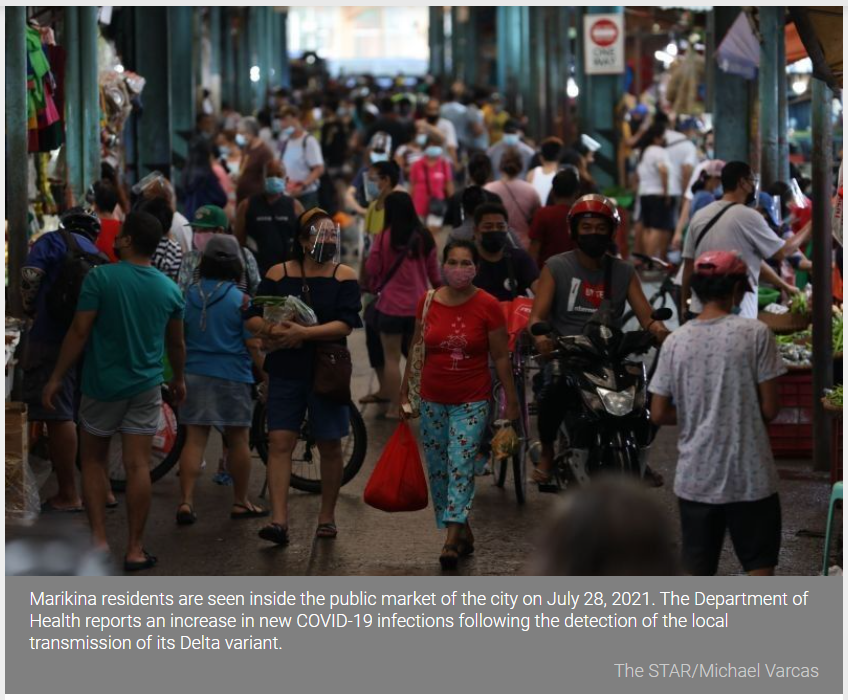Philippines: Inflation cools to 7-month low in July as transport costs ease
MANILA, Philippines (Update 1, 1:46 p.m.) — Consumer price growth softened to its lowest level in 7 months in July to return to the government’s target, mainly due to easing transport costs.
Inflation, as measured by the consumer price index, cooled down 4% year-on-year in July, slower than 4.1% clip recorded in the preceding month, the Philippine Statistics Authority reported Thursday. It was the slowest reading since 3.5% clip posted in December last year. At the same time, it settled within the government’s 2-4% inflation target.
Year-to-date, inflation averaged 4.4%
A slower annual increase of public transport costs — to 7% from 9.6% in the preceding month — mainly contributed to the deceleration of price upticks. In a statement, Bangko Sentral ng Pilipinas Governor Benjamin Diokno, who ushered in massive cuts to the policy rate to support an ailing economy, said the latest reading was “consistent with the BSP’s assessment”.
“The uptick in international commodity prices due to supply-chain bottlenecks and the recovery in global demand could lend upside pressures on inflation,” Diokno said.
“On the other hand, the emergence of new coronavirus variants and delays in easing lockdown measures are seen to pose downside risks to both demand and inflation,” he added.
While the softer inflation print in July was partly due to easing transport costs, the data was distorted by high base effects from last year, when tricycle fares sharply went up to meet commuter demand left by jeepneys, most of which were not allowed to ply routes due to lockdowns. Figures showed tricycle fares retreated 11.3% on-year in July from 17.6% in June, but National Statistician Claire Dennis Mapa said rides are starting to get more expensive again. Prices of fuel grew at a slower rate of 17.7%.
“In the past, tricycle fares were already high, more so that it increased June and July last year. Now, fares started going up in June,” he said in an online briefing.
Food prices are still a cause for concern. Despite meat inflation slowing down to 16% in July from 19.2% in the previous month, Mapa said it was mainly driven by lower prices of chicken. Pork inflation, meanwhile, grew 37.5% year-on-year and stayed relatively steady month-on-month despite the arrival of pork imports after the African swine fever ravaged hog stocks across large-scale and backyard farms in the country.
Prices of vegetables accelerated to 5% from 2.7% in the previous month after intense monsoon rains damaged crops, data showed.
For Nicholas Antonio Mapa, senior economist at ING Bank in Manila, upcoming typhoons and logistics problems amid on-off lockdowns may build some upward price pressures. Starting August 6, Metro Manila will be back to enhanced community quarantine (ECQ) — the strictest lockdown level — amid a sudden flare-up of infections believed to be fueled by the Delta variant.
“Reports of a possible 3-5% increase in the cost of basic food items (canned goods and packaged noodles) on top of a possible pickup in fruits and vegetables due to storm damage will all likely translate to elevated food inflation,” Mapa said in a commentary.
“The Philippine economy will likely hit a speed bump in 3Q with overall economic activity to slow further due to the imminent lockdown on 6 August,” he added.
Jun Neri, lead economist at Bank of the Philippine Islands, agreed with Mapa. “We expect inflation to remain elevated on supply chain disruptions due to ECQ and the pass thru impact of peso depreciation. Full year inflation will likely exceed the annual target,” Neri said.
Source: https://www.philstar.com/business/2021/08/05/2117796/inflation-cools-7-month-low-july-transport-costs-ease


 English
English




